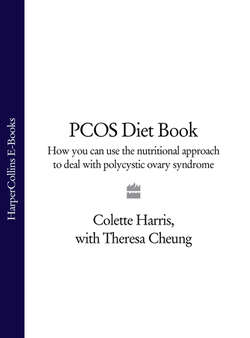Читать книгу PCOS Diet Book: How you can use the nutritional approach to deal with polycystic ovary syndrome - Theresa Cheung - Страница 11
THE PCOS METABOLISM – WHY DIETS DON’T WORK
ОглавлениеIt’s the weight gain that’s caused me most problems. I used to joke about being fat but inside I felt miserable and desperate. At my biggest I rocketed up to 16 stone 3 lb. I’m trapped in a vicious cycle. I know that losing weight will improve my symptoms, but I’m finding it virtually impossible.
Catherine, 30
If you have always felt you only need look at food to put on weight, your feelings are shared by many women with PCOS. You may have tried to diet and found it doesn’t work in the long run. At first you might see an improvement, but soon, the more you restrict your calories the more your body goes into starvation mode, conserving even more energy and storing away the calories it does get as fat reserves in case the ‘starvation’ carries on. You eventually reach a point where dieting doesn’t seem to help you lose weight.
If you have PCOS, in addition to your body’s typical reaction to restricted food intake you have another hurdle to face: women with PCOS store fat more efficiently and burn up calories more slowly than women who don’t have PCOS, even when they’re not on a diet.
I stopped having periods when I was about 17. My doctor put me on the Pill to balance my hormones. I have always been a little overweight. I used to be able to lose weight by dieting, but in the last few years however hard I try I just can’t shift the weight. It isn’t fair. I eat the same as my skinny friends but I’m putting on weight. And the fatter I get, the more facial hair I get. There are days when I just can’t face the world and want to hide from everyone.
Emma, 33
Your metabolic rate is the rate at which your body burns calories. The faster your metabolic rate, the more you can eat without putting on weight. The slower your metabolic rate, the more you need to watch your food intake. Metabolic rate is increased by any form of activity, including eating. The rate at which food is metabolized after a meal is called postprandial thermogenesis.
For most people, postprandial thermogenesis accounts for a large percentage of their daily calorie burning. But studies show that postprandial thermogenesis in women with PCOS is significantly reduced.8 Basically, after you eat a meal your body doesn’t burn up the calories as quickly as it would if you didn’t have PCOS. Your slower metabolism means you store more calories from the food you eat.
And if you have PCOS and insulin resistance, you also have to deal with the consequence of insulin preventing you from burning the calories off. According to Dr Richard S Legro in the American Journal of Obstetrics and Gynecology, women with PCOS showed as much as a 40 per cent lower response to the stress hormones that trigger the breakdown of fat than did healthy women, whether or not the PCOS women were obese.9
So not only does being overweight make you more likely to develop an increasing number and severity of symptoms, but if you have polycystic ovaries you are more likely to put on weight.
